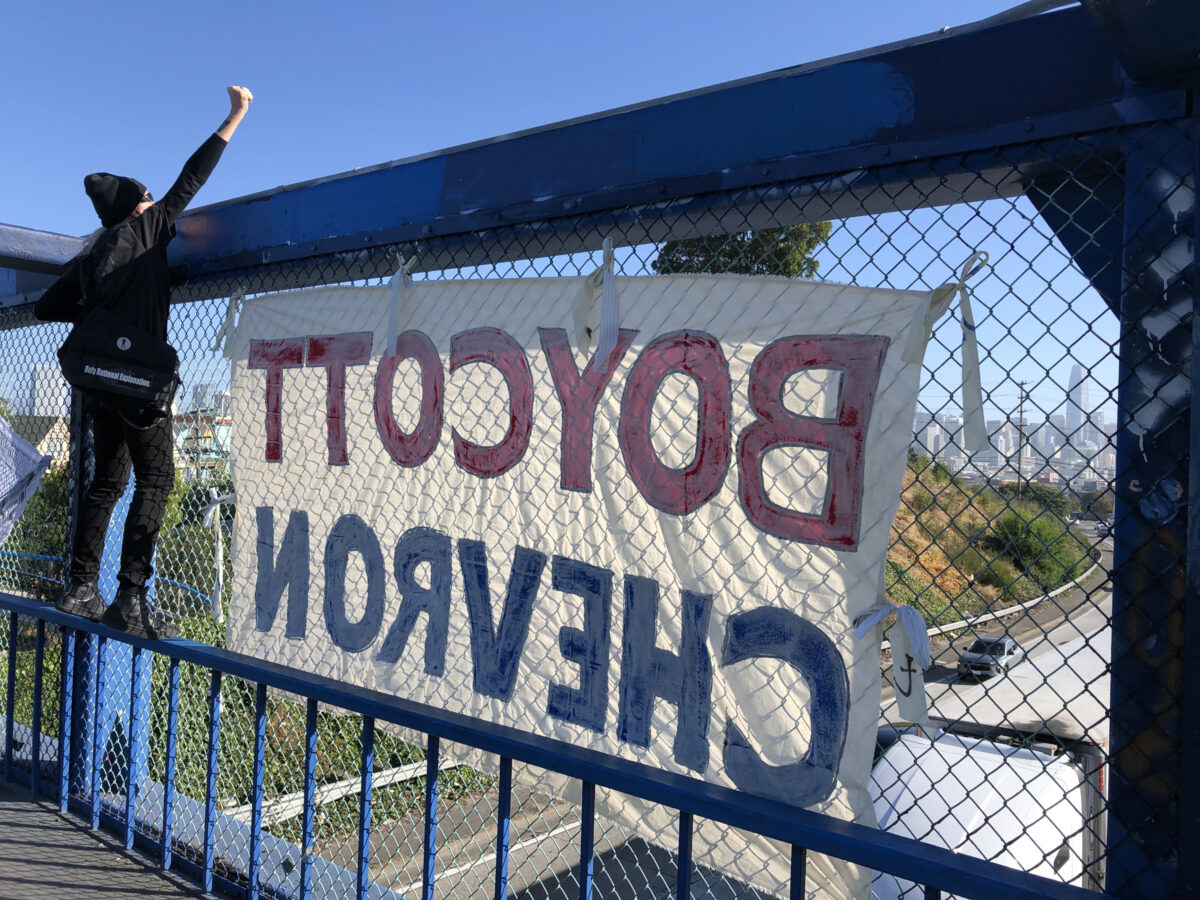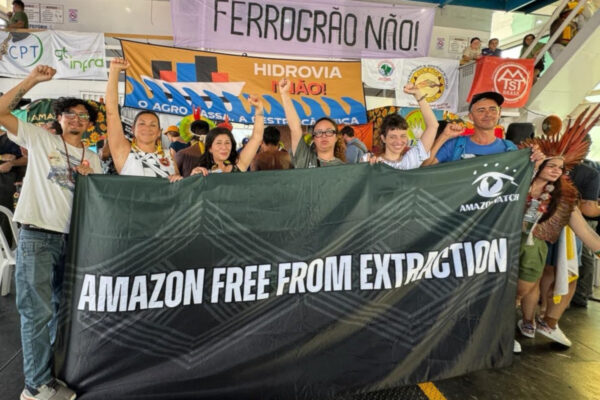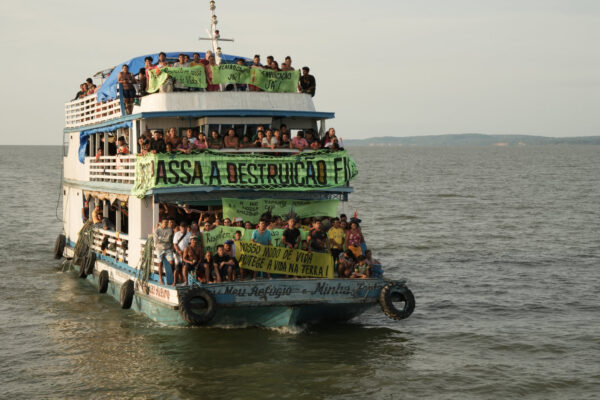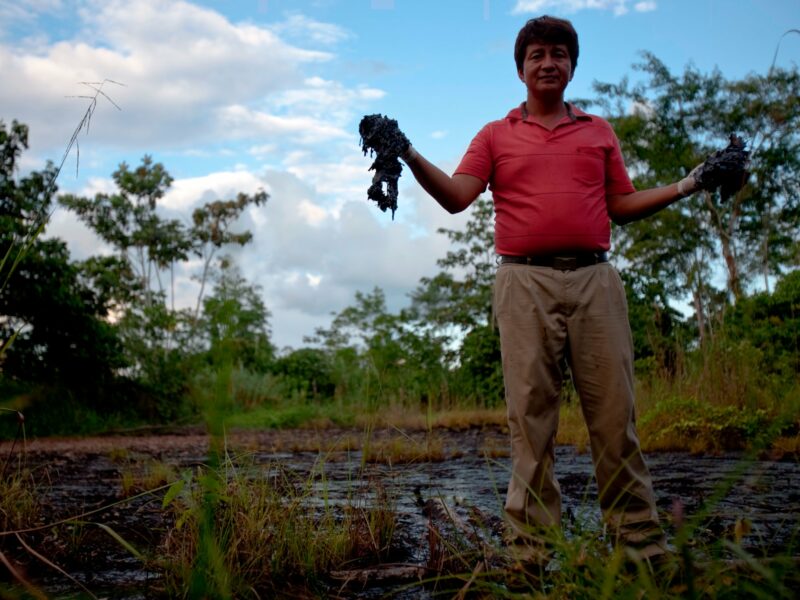San Francisco Bay Area, CA – Community members across the Bay Area organized simultaneous banner drops across several freeway overpasses in San Francisco, Berkeley, and Richmond yesterday as part of the international Anti-Chevron Day. This is the 12th year that communities across the world stand together to protest Chevron’s complicity in and direct perpetration of environmental destruction and human rights abuses.
This action highlights Chevron’s role in supplying energy and millions of dollars in taxes to Israel as it commits genocide against 2 million Palestinians in Gaza – violence that Israel has rapidly intensified with a full-scale invasion and forced starvation campaign.
Anti-Chevron Day is held one week before Chevron’s May 28 annual shareholders meeting. In response, local organizers are calling on individuals and institutions, such as universities and churches, to boycott and divest from Chevron because its profits come at the cost of genocide, apartheid, and the climate crisis. In Ecuador, Chevron dumped 16 billion gallons of toxic wastewater in order to save $3 per barrel, which poisoned the drinking and bathing water for thousands of people and entire communities, causing widespread cancer and miscarriages.
Israel’s genocide machine couldn’t run without power from Chevron. As Israel bombed hospitals, homes, universities, and UN schools in Gaza, the Chevron corporation supplied energy via the operation and co-ownership of Israeli-claimed fossil gas fields off the coast of occupied Palestinian land. Chevron also manages a pipeline that illegally runs from Israel to Egypt off the coast of Gaza, and is a key company implicated in supplying crude oil to Israel.
In addition to its complicity in grave violations of Palestinian human rights and the rights of other Indigenous communities around the world, Chevron is failing to align with international commitments to phase out fossil fuels and limit global temperature rise. Among all investor-owned companies, Chevron has produced the most cumulative climate pollution in history. If the company were held partially accountable for the climate loss and damage caused by its pollution, it would owe $900 billion.
Key Facts
- Tens of thousands of consumers have taken the pledge to boycott Chevron gas stations because its profits come at the cost of genocide, apartheid, and the climate crisis.
- Dozens of groups around the world have led pickets and other actions at Chevron locations.
- At least three cities have divested from Chevron.
Photos/Videos
Find local protest photos and videos available for publication in this folder.
Quotes
“I stand in deep solidarity with the families living next to this refinery. I know what it’s like – I was born into it, I’ve lived it, and I’ve lost loved ones because of it. This refinery looks old and unsafe, and I worry it could explode at any time. It should be shut down and moved somewhere it won’t harm anyone else. I know firsthand what it means to live next to the oil industry – and I know exactly what Chevron is capable of. Yet it is still afraid of us, because it has even covered its signs today to try to hide as we celebrate the anti-Chevron day. That truly shows that the company does not have the dignity to look us in the face,” said Donald Moncayo, President of the Union of Peoples Affected by Chevron/Texaco in Ecuador (UDAPT), upon visiting the site of Chevron’s Richmond refinery on Anti-Chevron Day.
“As a leader in the environmental justice movement, founder of the Beyond Chevron Campaign in Richmond, and key player in the success of the Richmond Polluters Pay initiative that forced the $550 million Chevron settlement, CBE and the Richmond community stand in bold resistance to Chevron’s destruction around the world,” said Lazuli Trujano, Richmond Community Organizer with Communities for a Better Environment.
“Organizers across the world are holding over 30 actions from Ecuador to Europe to Turtle Island. Here in the San Francisco Bay Area, we covered freeways during rush hour to educate our community of the connection between the harms in our backyards and those of faraway frontline communities. We have five refineries in the Bay Area, including two that have been on fire in the last few months. The Chevron refinery in Richmond is responsible not only for higher rates of chronic illness, but also these refineries importing crude oil from the devastation of the Amazon rainforest, and many other harms around the world. We stand together to say: not here, not anywhere. We must phase out fossil fuels for a livable future,” said Ilonka Zlatar, Organizer with Oil and Gas Action Network and member of the Boycott Chevron global campaign steering committee.
“Chevron is the only multinational oil company with a global day of protest held annually against its abuses – and for good reason. It has contributed more to global greenhouse gas emissions than any other investor-owned oil company in history. When it pollutes and harms communities – as it did by dumping billions of gallons of toxic waste in the Ecuadorian Amazon – it refuses accountability and instead deploys legal bullying tactics to silence its critics, adding insult to injury. This year marks twelve consecutive years of worldwide protests. Chevron and its executives must be held accountable,” said Paul Paz y Miño, Deputy Director of Amazon Watch.
Amazon Watch is an organization founded in 1996 to protect the rainforest and advance the rights of Indigenous peoples in the Amazon Basin. We partner with Indigenous and environmental organizations in campaigns for human rights, corporate accountability, and the preservation of the Amazon’s ecological systems.
Communities for a Better Environment (CBE) is one of the preeminent environmental justice organizations in the nation. Founded in 1978, the mission of CBE is to build people’s power in California’s communities of color and low-income communities to achieve environmental health and justice by preventing and reducing pollution and building green, healthy, and sustainable communities and environments. CBE provides residents in heavily polluted urban communities in California with organizing skills, leadership training, and legal, scientific, and technical assistance so that they can successfully confront threats to their health and well-being.
Oil Gas Action Network (OGAN) is a small and nimble organization that works to support grassroots and frontline movements taking action for a just world beyond fossil fuels.














